‘The head of the United Nations climate office said Wednesday that richer nations must pledge funds to poorer nations to make progress on a new agreement to curb global warming this year.’
News: Author Archive
U.N. Climate Chief Says Money for Poorer Nations Is Key to Copenhagen – NYTimes.com
Friday, October 30th, 2009Mass-market U.N. carbon scheme finds favor in India | Reuters
Friday, October 30th, 2009‘SINGAPORE (Reuters) – A new type of U.N. scheme is spreading clean energy technology to millions of people in India, promising to cut carbon emissions and help investors earn valuable carbon credits.’
via Mass-market U.N. carbon scheme finds favor in India | Green Business | Reuters.
Brazil drivers ditch biofuel over high sugar costs | Reuters
Wednesday, October 21st, 2009‘SAO PAULO Reuters – Some Brazilian motorists who fuel their cars solely on cane-based ethanol are switching back to gasoline as high sugar prices now make the biofuel more costly in some states.’
via Brazil drivers ditch biofuel over high sugar costs | Green Business | Reuters.
Video: Yve de Boer’s Closing Statement, Bangkok Climate Change Talks
Monday, October 19th, 2009Yve de Boer, Executive Secretary of the United Nations Framework Convention on Climate Change
“What we must do now is step back from self interest and let common interest prevail.”
Yvo de Boer addressing the press in Bangkok. Oct 9, 2009.
Text of Yvo de Boer’s Oct 9 address:
 "I believe that people around the world have a right to know exactly what their governments will do to address dangerous climate change. And this session has shown that it can be done, all the ingredients for success are on the table, and what we must do now is step back from self interest and let common interest prevail.
"I believe that people around the world have a right to know exactly what their governments will do to address dangerous climate change. And this session has shown that it can be done, all the ingredients for success are on the table, and what we must do now is step back from self interest and let common interest prevail.
At the New York summit two weeks ago world leaders set out a clear mandate to achieve this, but have not yet made clear all the commitments to make it work in practice. In Bangkok, their negotiators have shown rapid progress on concrete ways to implement the mandate, but there are still some long held differences. And now it’s urgent that governments bridge the disconnect and raise ambitions. The underlying spirit in this process remains constructive. And we have until up until yesterday evening seen significant advances in the process.
So it’s moving, but there is, as has been pointed out, this strong sense, this strong fear, that there is an attempt to, on the one hand, to kill the Kyoto protocol , as it has been explicitly said in the plenary this morning by a number of developing countries, to on the one hand kill the Kyoto protocol, while at the same time there is not even something better in sight or on offer. And that is causing a great deal of dissatisfaction, especially amongst developing countries. In spite of that, I think that people are driven by a huge sense of urgency – we’ve had two very constructive weeks here in Bangkok. People now have time to go back home. They have three weeks to think, to get ready for the next session when they open their exercise books again. And I hope they will use that period to go back to those world leaders who called for a breakthrough in Copenhagen, to tell those leaders where we stand in the process, and to get from those leaders a mandate to resolve the key political issues that are outstanding."
Farm Bureau Aims to Kill Climate Bill – NYTimes.com
Friday, October 16th, 2009‘The politically influential American Farm Bureau, the self-described “national voice of agriculture,” has outlined a new campaign effort to derail Congressional bills to combat climate change.’
via Farm Bureau Aims to Kill Climate Bill – Green Inc. Blog – NYTimes.com.
U.N. climate talks may need extra time in 2010 | Reuters
Thursday, October 15th, 2009‘OSLO Reuters – World climate talks may need extra time next year to agree cuts in greenhouse emissions for 2020 since U.S. laws are unlikely to be in place before a U.N. meeting in Copenhagen in December, experts say.’
via U.N. climate talks may need extra time in 2010 | Green Business | Reuters.
By Degrees – Curbing Climate Change While Capturing Lost Methane – NYTimes.com
Wednesday, October 14th, 2009‘Acting quickly to stanch the loss of methane could substantially cut warming in the short run, even as countries tackle the tougher challenge of cutting the dominant greenhouse emission, carbon dioxide, studies by researchers at the Massachusetts Institute of Technology suggest.’
via By Degrees – Curbing Climate Change While Capturing Lost Methane – Series – NYTimes.com.
Denmark’s top climate negotiator quits ahead of talks | Reuters
Monday, October 12th, 2009‘COPENHAGEN Reuters – Denmark’s top climate policy negotiator has resigned with less than two months to go before the world meets in Copenhagen to agree on a new deal to curb the effects of climate change.’
via Denmark’s top climate negotiator quits ahead of talks | Green Business | Reuters.
Commercial green fuel from algae still years away | Green Business | Reuters
Friday, October 9th, 2009‘SAN DIEGO Reuters – Filling your vehicle’s tank with fuel made from algae is still as much as a decade away, as the emerging industry faces a series of hurdles to find an economical way to make the biofuel commercially.’
via Commercial green fuel from algae still years away | Green Business | Reuters.
Food, Inc. screened at UC Berkeley with Panel Discussion
Thursday, October 8th, 2009
Food, Inc was screened at UC Berkeley’s packed Wheeler Auditorium Tuesday night, followed by a lively panel discussion with (left to right) UC Professor and author Michael Pollan, Director Robert Kenner, author Eric Schlosser, and Farmer Troy Roush. Pollan, Schlosser, and Roush were all prominently featured in the film.
This compelling yet disturbing documentary has been widely detailed and reviewed elsewhere, though it’s worth noting that the largely student audience attending this Cal Performances event received both the film and panel with palpable enthusiasm.
The panel discussed issues of power and control behind the food industry, vegetarianism, challenges making the film, and other topics.
Panel discussion and Q & A excerpts:
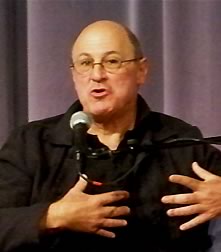 Director Robert Kenner compares making Food, Inc. to his other films:
Director Robert Kenner compares making Food, Inc. to his other films:
…I also spent probably 15 more times in legal fees in making this film. And the big concern was whether the film was going to be enjoyed, whether they would stop it from getting to the theaters… There’s certainly a number of websites out there attacking it – I’m certainly not used to that experience.
I was very concerned with the economy tanking whether there would be any audience for this movie. We had just rushed in about peak oil, and what’s going to happen if prices keep going up, then everything dropped and I thought oh my god this film has lost all relevancy, and the release date was for June … I wasn’t sure what was going to happen. But it turned out to be pretty good timing with Obama, also there was a sense that you can change things, so I was pleasantly surprised. It worked out really well on that front.
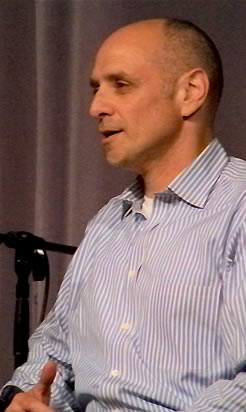 Eric Schlosser (author of Fast Food Nation)::
Eric Schlosser (author of Fast Food Nation)::
When you look at Robbie’s film, and to me it’s an amazing documentary, and it’s one of the most successful documentaries of recent years. And yet in the grand media it’s almost insignificant. I mean the fast food chains will spend more on a thirty second ad then this film costs … The food industry spends something like nine or ten billion dollars on marketing alone every year. The marketing budget for this documentary was significantly less.
And what’s so interesting to me is that they still need to try to crush it, and they still need to try to attack anyone who disagrees with them. And to me it’s really revealing about the broader system, and I care enourmously about food, and since Fast Food Nation came out- it’s almost a decade, and I really tried to use it as an activist, but the most important thing about this film for me has nothing to do with food. It has to do with concentrated power and how corrupting that is to this society, and how they don’t want you guys to even have a different point of view. The irony is that it’s all about free enterprise and freedom of expression, but as soon as somebody contradicts them, they try to crush them. And to me it’s actually very encouraging that the book, and the film, which in the realm of Hollywoood is an insignificant tiny little investment, can still irritate very mean powerful companies. And that’s kind of for me why I try to do the work that I do and I know it’s why you guys do, and I think it’s very revealing about this system and how it operates, and I hope all of you will really think twice about the messages your getting form the mainstream and seek out alternative sources of information.

"…the most important thing about this film for me has nothing to do with food. It has to do with concentrated power and how corrupting that is to this society" – Eric Schlosser
Audience Question: what do you think of vegetarians and veganism?
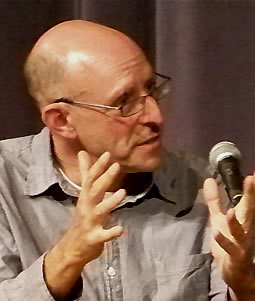 Professor Michael Pollan (author of The Omnivore’s Dilemna & In Defense of Food ):
Professor Michael Pollan (author of The Omnivore’s Dilemna & In Defense of Food ):
I think we’re all omnivores here…
I have absolutely enourmous respect for vegetarians and vegans for the simple reason that they have made a decision about what they are going to eat and they are conscious of it and they have connected their eating choices to their values. And having gone through that process, which so few Americans have, even now, I think is incredibly admirable. I’ve gone through that process too – I’ve come out in a different place. But you know, all that I ask is that they be conscious rather than eat in any particular way. I’m convinced that if people pay attention to what they are doing, where their food comes from, they will make better choices.
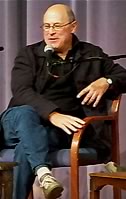 Robert Kenner:
Robert Kenner:
Just on a level that we are going to have to eat less meat as we go on, that’s a factor. I think we’ve been attacked as many times by people from PETA for not saying that everyone has to be a vegetarian as we have from Monsanto. …hopefully this film will make you think about eating less meat without having to say that’s what we should do. and I think we should do it for numbers of reasons. But I didn’t think it would be helpful. And what I thought was most important was to make a film for people who had not thought about their food. And ultimately it’s a film that hopefully goes beyond food to think about politics and consolidation of corporate power, and I think it could be alienating if we had sort of demanded, before said this is very important, you should become a vegetarian, so hopefully this will influence people in that direction.
Consumer Driven Change vs. Policy Change
Michael Pollan (to Troy): How do you see change coming? You had the last word in the film and you suggested it’s up to consumers. Is that really where it’s going to come from, or is there the possibility of political action or changes in the policy world?
 Farmer Troy Roush: …Well, certainly the political options are there … we farmers are going to answer to the demand whatever that demand may be. So, if I no longer have a market for I’m producing I’m going to change my ways and I’m going to do it quite quickly. I’m going to adapt to that market.
Farmer Troy Roush: …Well, certainly the political options are there … we farmers are going to answer to the demand whatever that demand may be. So, if I no longer have a market for I’m producing I’m going to change my ways and I’m going to do it quite quickly. I’m going to adapt to that market.
Michael Pollan: Are you free to do that though?
Troy Roush: I’m a midwestern farmer, and midwestern farmers produce two things – corn and soybeans, and soybeans and corn. I’m a little different in that I have an organic segment and I also have a vegetable segement to my business. I produce seed tomatoes. When I first got into the tomato business, I planted something like eight acres of tomatoes, and I won’t go into the details of it cause it doesn’t even make sense to me…but that little mistake by planting those eight acres of tomatoes cost me $22,000 in fines from our government. In a lot of ways, farmers hands are tied. So we certainly do need to talk about policy change.
Michael Pollan: But once you get into the commodity subsidy program, and your land is designated as corn bean land, your not allowed to produce anything else.
Troy Roush: Absolutely true. Quite frankly, a lot of farmers don’t realize that when they put that little patch of sweet corn out there for the family to eat off of, they’re in violation of that rule and they can certainly be fined. The difference is I actually went and reported what I did and was fined as a result.
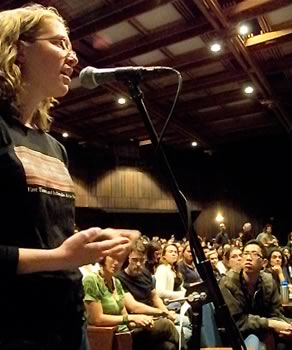 Julie Klinger, UC-Berkeley grad student and fourth generation member of a Northern Illinois industrial farming family, quoted her family’s reaction to another film, "The Future of Food", which raises similar issues: "They said that they were aware of the issues. They said three things: We don’t have a choice: we’re serfs on our own land; we are our own worst enemy*; and we want to take care of the soil that we farm".
Julie Klinger, UC-Berkeley grad student and fourth generation member of a Northern Illinois industrial farming family, quoted her family’s reaction to another film, "The Future of Food", which raises similar issues: "They said that they were aware of the issues. They said three things: We don’t have a choice: we’re serfs on our own land; we are our own worst enemy*; and we want to take care of the soil that we farm".
[*by failing to organize a collective response to government programs which encourage overproduction, farmers act against their own self interest. The higher volume drives prices down, locking farmers onto a treadmill of of debt and dependency on continuous overproduction.]
"What sort of farmer driven solutions might there be towards advocating policy change, and how can we at this university as students and faculty join with farmers to help really think about the kind of change that we want to see?"
Troy Roush: You know as farmers the first thing that we’ve got to do is actually get control of the organizations that are supposed to represent us. ..as farmers we’ve got to take ownership of what we’re doing. I certainly appreciate the point that you family made – ‘we don’t have a choice’. It’s not necessarily true. We don’t have easy choices – but we certainly have choices.
In my own situation I’ve diversified into a small organic segment that I’m proud of… I also diversified into non-GMO cream, also a very nice segment.
We have options – we just have to explore them.
Eric: What about the federal level. Let’s say you had control of the farm bureau, what kind of policies would you advocate for the new farm bill – are there policy changes – besides allowing you to grow vegetables – that would help to drive this market forward?
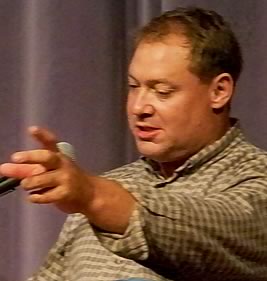 Troy Roush: (Joking) I would go to the farm bureau and fire everybody so… (laughter)
Troy Roush: (Joking) I would go to the farm bureau and fire everybody so… (laughter)
The way farm programs run – and I hate to get into this because it gets just far too complex, but the system of subsidies that we currently have is just ridiculous. They basically are set up to allow us to produce at below cost of production, and this has a lot of unintended consequences – and maybe they are intended I don’t know – the first thing is it provides grains or feedstocks to the CAPO, these large animal feeding operations at below cost of production, which actually drives the farmers out of the business of raising their own livestock – it’s crazy.
The second unintended consequences are, at least I hope it’s unintended, is that a lot of developing nations can’t afford to grow their own food because we’re going to export to them below cost of production. So we need to change that model. We need to change from something below cost of production to something that sets a floor underneath the commodity price that insures a minimum wage would be a good way to put it.
Monsanto
Robert Kenner: One thing that happened is that Kramer of Mad Money show came out and said that he had inside information – because of Food.inc the White House was going to go after Monsanto – and the stock dropped, and it looks like that might be happening, so that’s … (applause).
Troy Roush: "I’ve been battling Monsanto off and on now for thirteen years. You know, it wasn’t until Robbie’s film that I got my own page on the website."
report by James George
